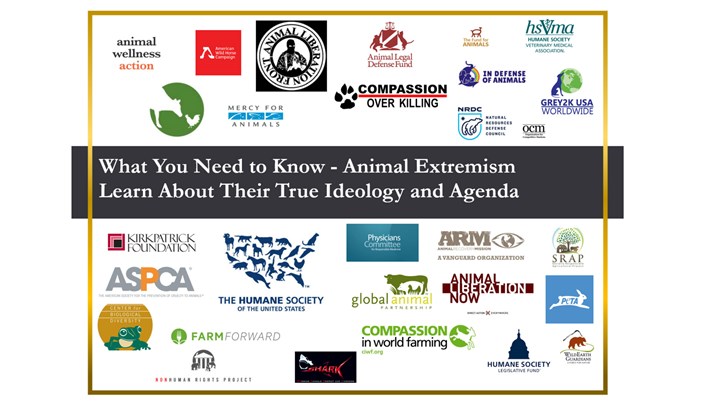
by Mark Chesnut - Tuesday, January 16, 2024

While the National Rifle Association and other pro-hunting organizations fight to protect our hunting heritage, it’s important to note that the so-called “animal rights” movement has grown into a billion-dollar industry.
That’s according to a recent report released by protecttheharvest.com, which delves into more than a dozen groups profiting from the movement that has American hunters directly in its crosshairs.
“The list of their activities is very long and includes working to influence law enforcement, teachers, children in school, religious institutions and more,” the Protect the Harvest study states. “These organizations are not concerned with animal welfare, they are concerned with pushing their agenda, which has far-reaching implications for all Americans.”
Of course, the American Society for Prevention of Cruelty to Animals (ASPCA) is atop the group’s list, and there’s little wonder why. As this NRA Hunters’ Leadership Forum website has chronicled in the past, the organization wants to stop all hunting, but there are other reasons for hunters to not support the group and to spread the word to their friends and family.
While the group fundraises on supporting animal shelters—despite the fact that it is unaffiliated with local shelters—only about 4 percent of money donated to ASPCA goes to support animal shelters. In fact, fundraising is the group’s top priority, as it spends tens of millions of dollars on advertising and marketing, far more than it spends on helping animals of any kind.
Another group of anti-hunters that tricks its donors is the Humane Society of the United States HSUS). Often confused with local Humane Societies, this fundraising behemoth is happy to receive donations that gullible contributors believe will go to helping local animal shelters—even though HSUS doesn’t run or operate a single one.
And of the money donated to the group, very little goes to help animals. After funding battles against hunting and other legitimate animal uses, much of its proceeds line the pockets of wealthy upper management.
“They use their donors’ money to write, fund and push legislation,” the study states. “They also use it for marketing, advertising, fundraising, salaries, retirement plans, for investments in offshore bank accounts and publicly traded securities.”
Of course, the group is no friend to hunters, despite undoubtedly receiving contributions from many who aren’t opposed to hunting. As NRAHLF.org has repeatedly explained, the HSUS has long raked in donations, some of which are used for campaigns to close hunting seasons, by fooling well-intentioned people into giving it money. “Uninformed people assume the HSUS will use its donations to neuter, shelter or otherwise help all the sad-eyed cats and dogs it puts in its ads,” the website notes.
Of course, People for the Ethical Treatment of Animals (PETA) received an extended amount of attention in the report and is always worthy of mentioning any time animal “rights” and anti-hunting are discussed. As the report explains, animal rights groups have even infiltrated the United States Congress, with PETA, HSUS and ASPCA pushing for the creation of the Congressional Animal Protection Caucus. The group was formed in 2009.
“The Congressional Animal Protection Caucus (CAPC) is a growing group of lawmakers who are being influenced by animal extremist ideology,” the report states. “Voters should be wary of the legislation the caucus pushes and the politicians involved in the group.”
Some of the groups highlighted in the Protect the Harvest Report are those that target farmers and ranchers for raising the livestock that feeds Americans. As we explained last year, the war on meat is a war on hunting. Groups such as Farm Forward, Compassion in World Farming and Global Animal Partnership want to end meat eating altogether, and many apply the same emotional anti-meat strategy to hunters that they do to farmers and ranchers.
In the end, it’s distressing to know that the move to end hunting and other animal uses has grown so large, and that many such groups’ tactics fool people into supporting an agenda they likely don’t embrace. Now would be a good time for all hunters to talk to their family and friends and make sure they aren’t mistakenly contributing to organizations that actively seek to end our way of life.
About the Author
Freelance writer and editor Mark Chesnut is the owner/editorial director at Red Setter Communications LLC in Jenks, Okla. An avid hunter, shooter and bird dog field-trialer, he has been covering Second Amendment issues and politics on a near-daily basis for almost 25 years.
E-mail your comments/questions about this site to:
[email protected]
Proudly supported by The NRA Foundation and Friends of NRA fundraising.
